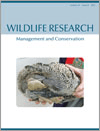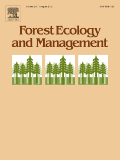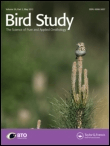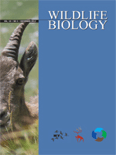
JOURNAL OF WILDLIFE MANAGEMENT
Scope & Guideline
Exploring the intersection of ecology and conservation.
Introduction
Aims and Scopes
- Wildlife Population Dynamics:
Research on population dynamics, including studies on birth rates, mortality, and factors influencing population viability, is crucial for effective wildlife management. - Habitat Management and Conservation:
Studies that address habitat selection, management practices, and the impact of environmental changes on wildlife habitats are central to the journal's scope. - Human-Wildlife Interactions:
Exploring the interface between human activities and wildlife, including conflict management, conservation strategies, and the socio-economic aspects of wildlife management. - Ecological Research and Methodologies:
The journal publishes innovative methodologies in wildlife research, including genetic studies, tracking technologies, and statistical modeling, to enhance wildlife management practices. - Indigenous Knowledge and Co-management:
Recognition of Indigenous perspectives in wildlife management, focusing on co-management approaches that integrate traditional ecological knowledge with contemporary science.
Trending and Emerging
- Climate Change Impact Studies:
There is an increasing focus on understanding how climate change affects wildlife populations, habitats, and management practices, as researchers seek to address urgent conservation challenges. - Technological Innovations in Wildlife Monitoring:
The use of advanced technologies, such as drones, camera traps, and genetic sampling, for wildlife monitoring and research is on the rise, enabling more effective management strategies. - Community-Based Conservation Approaches:
Emerging themes include community engagement and participatory approaches to wildlife management, emphasizing the role of local stakeholders in conservation efforts. - Behavioral Ecology and Adaptations:
Research on the behavioral adaptations of wildlife in response to environmental changes and human activities is gaining traction, highlighting the need for adaptive management strategies. - Restoration Ecology:
A growing interest in restoration ecology, particularly in the context of habitat restoration and species recovery, reflects a shift towards proactive conservation efforts.
Declining or Waning
- Traditional Hunting Practices:
Research centered on traditional hunting practices and their role in wildlife management has declined as contemporary conservation approaches gain prominence. - Non-native Species Management:
There has been a noticeable reduction in publications specifically addressing management strategies for invasive species, suggesting a shift towards more integrated ecological studies. - Historical Perspectives on Wildlife Management:
Papers that focus on historical case studies and analyses of past management practices seem to be less frequent, possibly overshadowed by emerging contemporary issues.
Similar Journals

Frontiers in Ecology and Evolution
Innovating pathways in the study of life’s diversity and adaptation.Frontiers in Ecology and Evolution, published by FRONTIERS MEDIA SA, stands as a premier open-access journal dedicated to the exploration and discourse in the interdisciplinary fields of ecology and evolutionary biology. With its inception in 2013, this journal has rapidly ascended to a prestigious position, securing a Q1 ranking in both Ecology and Ecology, Evolution, Behavior and Systematics categories, reflecting its influential impact in the respective fields. Operative from Switzerland, Frontiers in Ecology and Evolution enables researchers, professionals, and students to access high-quality research without barriers, promoting collaboration and innovation. The journal covers a broad range of topics, from ecological dynamics to evolutionary strategies, facilitating profound insights that drive scientific advancement and understanding. With a remarkable position in Scopus rankings—ranking #218 in Ecology, Evolution, Behavior and Systematics and #145 in Environmental Science—this journal is essential for anyone keen on contributing to or staying updated with contemporary research in ecology and evolution.

NORTHWEST SCIENCE
Unveiling the complexities of nature through rigorous research.NORTHWEST SCIENCE, published by the NORTHWEST SCIENTIFIC ASSOCIATION, serves as a vital resource for researchers and professionals in the fields of ecology, evolution, and systematics. With an ISSN of 0029-344X and an E-ISSN of 2161-9859, this journal has been disseminating valuable scientific insights since its inception in 1975 and continues to do so into 2024. Although currently positioned in the Q4 quartile for its category, it plays a crucial role in advancing the understanding of ecological and biological sciences, reflecting a diverse range of studies and methodologies. Researchers will find the journal particularly appealing due to its emphasis on regional studies and their implications on a global scale. While NORTHWEST SCIENCE is not an open-access publication, it provides significant contributions to the academic dialogue within its discipline, making it an essential addition to the library of any dedicated researcher, student, or professional in the environmental sciences.

WILDLIFE SOCIETY BULLETIN
Fostering interdisciplinary insights for wildlife stewardship.WILDLIFE SOCIETY BULLETIN is a premier publication in the field of wildlife management and conservation, published by Wiley. With an ISSN of 2328-5540, it serves as an essential resource for researchers, professionals, and students invested in advancing knowledge related to wildlife ecology, behavior, and conservation practices. Although currently not open access, the journal provides a platform for high-impact research and critical insights that contribute to the sustainable management of wildlife and their habitats. The WILDLIFE SOCIETY BULLETIN aims to foster interdisciplinary discussions and provide a vital connection between academia and practical applications, ultimately promoting a deeper understanding of wildlife conservation challenges and solutions. Located at 111 River St, Hoboken, NJ, it continues to be influential in disseminating significant findings that shape policies and practices in wildlife stewardship.

WILDLIFE RESEARCH
Elevating Standards in Wildlife Ecology and ManagementWILDLIFE RESEARCH is a leading journal dedicated to the rigorous study of wildlife ecology and management, published by CSIRO PUBLISHING in Australia. With a notable ISSN of 1035-3712 and an E-ISSN of 1448-5494, this prestigious journal has been at the forefront of advancing knowledge in the fields of ecology, evolution, behavior, and systems since its inception in 1974. Spanning over four decades, WILDLIFE RESEARCH has established itself as a Q1 journal in Ecology, Evolution, Behavior and Systematics and Q2 in Management, Monitoring, Policy and Law as of 2023, indicating its substantial impact and relevance in these critical areas. It ranks impressively in Scopus, with scores in the 72nd and 58th percentiles respectively for its categories, reflecting its commitment to high-quality research. The journal does not offer open access options, but it provides valuable insights for researchers, professionals, and students aiming to contribute to wildlife conservation and management practices. As it approaches its 50th year, WILDLIFE RESEARCH continues to play an essential role in shaping the discourse around environmental science, policy, and biodiversity conservation in the global landscape.

FOREST ECOLOGY AND MANAGEMENT
Connecting Research to Policy for Forest SustainabilityFOREST ECOLOGY AND MANAGEMENT is a premier peer-reviewed journal dedicated to the integral study of forest ecosystems and their management, published by Elsevier in the Netherlands. With an impactful presence in the field, this journal boasts a prestigious Q1 ranking in multiple categories, including Forestry, Management, Monitoring, Policy and Law, and Nature and Landscape Conservation as of 2023. It addresses key issues relevant to sustainable forest practices, conservation strategies, and environmental monitoring, making it a vital resource for researchers, practitioners, and policymakers alike. The journal is indexed with an impressive Scopus rank, placing it among the top tier of titles in Agricultural and Biological Sciences and Environmental Science. While it does not offer Open Access options, its rigorous review process and high visibility make it essential for those seeking to stay abreast of the latest findings and trends in forest ecology and management. Published continuously since 1976, FOREST ECOLOGY AND MANAGEMENT aims to foster interdisciplinary collaboration and advance knowledge critical to the stewardship of forest resources in an ever-changing global landscape.

Frontiers in Conservation Science
Empowering Research to Protect Our Natural HeritageFrontiers in Conservation Science, published by Frontiers Media SA in Switzerland, is an esteemed open-access journal dedicated to advancing research in the field of conservation science. With an E-ISSN of 2673-611X, this journal aims to facilitate the exchange of knowledge among researchers, professionals, and students by publishing high-quality, peer-reviewed articles that explore innovative solutions to contemporary conservation challenges. Since its establishment in 2020, the journal has rapidly ascended to a Q2 ranking in the Nature and Landscape Conservation category, reflecting its commitment to impactful scholarship, as evidenced by its Scopus rank of #93 out of 211 in Environmental Science and a 56th percentile ranking. By promoting open access, Frontiers in Conservation Science ensures that vital research is widely disseminated, fostering collaboration and informed decision-making in the conservation community. This journal is a crucial platform for those dedicated to understanding and preserving our planet's biodiversity and landscapes.

BIRD STUDY
Connecting researchers to the heartbeat of bird study.BIRD STUDY, an esteemed journal published by Taylor & Francis Ltd, stands at the forefront of avian research, contributing significantly to the fields of ecology, evolution, behavior, and conservation. With its ISSN 0006-3657 and E-ISSN 1944-6705, this journal has been a cornerstone of ornithological studies since its inception in 1954 and continues to provide a critical platform for the dissemination of knowledge through 2024 and beyond. It holds a respectable Q3 quartile ranking in both Ecology, Evolution, Behavior and Systematics and Nature and Landscape Conservation, reflecting its pivotal role in the academic community. While the journal is not open access, it continues to attract submissions from a diverse array of researchers and professionals eager to share their findings on the intricate and dynamic interactions of birds within their ecosystems. As the global focus on biodiversity and conservation intensifies, BIRD STUDY remains dedicated to fostering knowledge and encouraging evidence-based practices that aim to protect avian species and their habitats.

Journal of Fish and Wildlife Management
Championing research that shapes conservation policy.The Journal of Fish and Wildlife Management, published by the U.S. Fish & Wildlife Service, serves as a vital resource for scholars, researchers, and professionals in the fields of Animal Science, Ecology, and Conservation Biology. With its ISSN 1944-687X, this esteemed journal has been disseminating critical research findings since 2010, contributing significantly to the understanding of fish and wildlife conservation practices and their ecological impacts. Despite its Q3 category rankings in various disciplines as of 2023, it provides a platform for innovative research that influences policy and management strategies for biodiversity conservation. The journal, although not open access, remains committed to advancing the scientific discourse surrounding wildlife management with articles that emphasize practical conservation efforts and ecological sustainability. Readers can expect a diverse range of articles that promote best practices in the management and conservation of fish and wildlife resources, furthering our collective mission of preserving ecological health and biodiversity for future generations.

PACHYDERM
Fostering global awareness through groundbreaking elephant studies.PACHYDERM is a reputable journal dedicated to the study and conservation of elephants, published by the esteemed IUCN-SSC Asian Elephant Specialist Group. It serves as a crucial platform for researchers, conservationists, and wildlife professionals to disseminate innovative findings and share insights into elephant ecology, behavior, and conservation strategies. Featuring an impressive scope from 2008 to 2015 and resuming from 2017 to 2023, the journal falls within the Q3 category of Animal Science and Zoology, reflecting its growing impact in the field with a Scopus rank of #367/490. Although currently not open access, PACHYDERM's content is vital for those committed to advancing our understanding and protection of these magnificent creatures. By fostering collaboration and highlighting critical research, PACHYDERM plays an integral role in promoting global awareness and conservation efforts surrounding elephants.

WILDLIFE BIOLOGY
Exploring the intricate connections of nature's diversity.WILDLIFE BIOLOGY is a prestigious open-access journal published by WILEY, dedicated to the dissemination of high-quality research in the fields of ecology, evolution, behavior, and conservation. With an impressive Impact Factor indicative of its scholarly relevance, the journal has been a cornerstone for researchers since its inception in 1995, now extending its convergence through 2024. Recognized within the top Q1 and Q2 quartiles across various categories—including Ecology, Evolution, Behavior and Systematics and Management, Monitoring, Policy and Law—this journal plays a crucial role in fostering knowledge and promoting effective solutions in wildlife biology. The journal serves a diverse audience, offering robust access options since 2014, ensuring that vital research is freely available to professionals, researchers, and students alike. With its base in Denmark, the journal encourages contributions that address pressing wildlife management issues and informs policy development, further cementing its significance in the ecological research community.